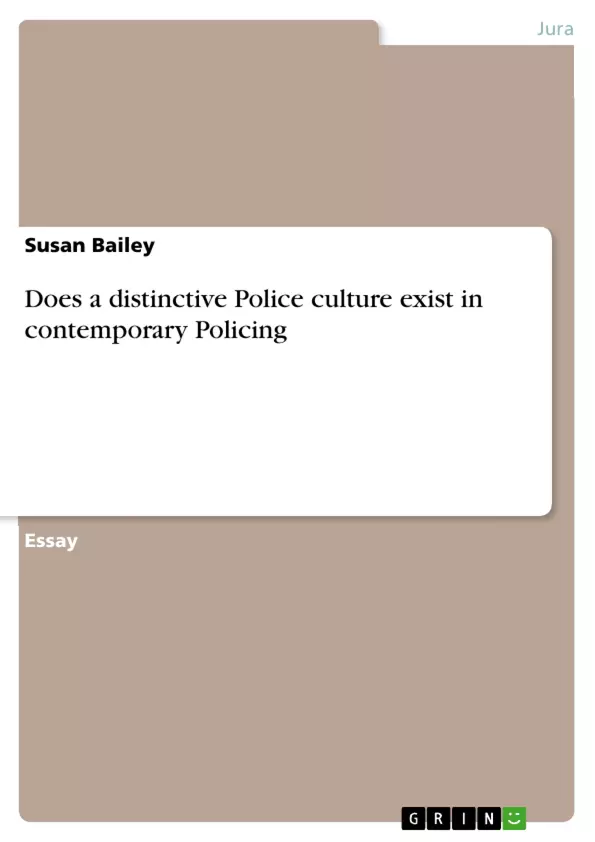This essay investigates whether there is a distinctive police culture within UK law enforcement
The term ‘police culture’ is used to describe a complex set of beliefs and values held within the police force. Culture has also been described as a patterned set of understandings to enable officers to cope, and adjust, to the pressures and tensions of front line policing. There has been an increasing public interest in police culture over the past forty years, this interest is mainly due to public concerns, and therefore a discussion will be attempted, to look at if, and how police culture has changed. Events such as the Scarman Report have identified many of the problems within police culture, as has the Macpherson Report, this essay will seek to evaluate whether these issues have been resolved in contemporary policing. A great number of scholars have studied police culture, such as, Reiner, Skolnick, Westley and Wilson, although most observational studies have focussed on uniformed officers, ignoring the behavioural differences and attitudes between “street cops” and “managerial cops”. Reiner famously summarised that police officers have core characteristics, he described the police as pessimistic, conservative, mission orientated, isolated, suspicious and masculine. Policing has traditionally been a heterosexual, white male dominated occupation. With officers usually coming from an upper working class background, with very little formal education. This created issues for individuals who did not fit these requirements due to sexuality, ethnicity or gender. Stereotypical ‘cop culture’ has been described as almost a pure form of hegemonic masculinity. Officers are described to be aggressive, competitive and have a very patriarchal view towards women, often using racist or sexist language. Women encountered significant difficulty gaining acceptance into the police force as ‘real’ officers. Members of the force become extremely loyal towards each other, and became isolated from others outside of the force. Westley suggested that police officers react this way for self-protection from the hostile world, as they see it. Joining together in isolation, and secrecy, from those outside of the police force.
Inhaltsverzeichnis
- PART ONE
- Student and assessment details (to be completed by student)
- PROGRAMME TITLE
- Criminological Studies with Social Sciences
- Policing
- MODULE TITLE
- ASSESSMENT TYPE (e.g. report, essay, etc)
Zielsetzung und Themenschwerpunkte
Dieser Text befasst sich mit der Entwicklung und Veränderung der Polizei-Kultur in Großbritannien, insbesondere im Hinblick auf Rassismus und Geschlechterdiskriminierung.
- Die Entstehung und Merkmale der Polizei-Kultur
- Die Auswirkungen der Polizei-Kultur auf die Beziehungen zwischen Polizei und Minderheiten
- Die Rolle von Berichten wie dem Scarman Report und dem Macpherson Report bei der Reform der Polizei
- Die Kontinuität von Rassismus und Diskriminierung innerhalb der Polizei
- Der Einfluss von Medienberichten auf die Wahrnehmung der Polizei-Kultur
Zusammenfassung der Kapitel
Das erste Kapitel beleuchtet die Entstehung und Definition der Polizei-Kultur, wobei die Kernmerkmale der Polizei-Kultur sowie die traditionellen Anforderungen an Polizisten hervorgehoben werden. Es wird auf die historischen Herausforderungen für Frauen und ethnische Minderheiten hingewiesen, die in die Polizei eintreten wollten.
Das zweite Kapitel konzentriert sich auf die Folgen der Polizei-Kultur für die Beziehungen zwischen Polizei und Minderheiten. Der Scarman Report wird vorgestellt und seine Empfehlungen zur Verbesserung der Beziehungen zur schwarzen Gemeinschaft werden zusammengefasst.
Das dritte Kapitel analysiert die Auswirkungen des Macpherson Reports, der nach dem Mord an Stephen Lawrence veröffentlicht wurde. Der Bericht enthüllte institutionellen Rassismus innerhalb der Polizei und führte zu Empfehlungen für Reformen, darunter das verstärkte Training in Bezug auf Rassismusbewusstsein.
Schlüsselwörter
Polizei-Kultur, Rassismus, Diskriminierung, institutioneller Rassismus, Scarman Report, Macpherson Report, Medienberichte, öffentliche Wahrnehmung, Polizeireformen, ethnische Minderheiten, Geschlechterungleichheit.
Häufig gestellte Fragen
Existiert eine spezifische Polizei-Kultur?
Ja, die Arbeit beschreibt Polizei-Kultur als ein komplexes Set an Werten und Überzeugungen, die Polizisten helfen, mit den Spannungen des Dienstes umzugehen.
Was ist institutioneller Rassismus in der Polizei?
Der Begriff wurde durch den Macpherson Report geprägt und beschreibt das kollektive Versagen einer Institution, Menschen aufgrund ihrer Herkunft angemessen und professionell zu behandeln.
Welche Bedeutung hat der Scarman Report?
Der Scarman Report identifizierte Probleme in der Beziehung zwischen der Polizei und Minderheiten und gab Empfehlungen zur Reform der Polizeiarbeit in Großbritannien.
Wie werden Polizisten in der soziologischen Forschung charakterisiert?
Forscher wie Reiner beschreiben Kernmerkmale wie Pessimismus, Isolation, Missionarismus und eine traditionell maskulin geprägte Kultur.
Haben Frauen in der Polizei mit Diskriminierung zu kämpfen?
Die Arbeit zeigt auf, dass die traditionelle Polizei-Kultur oft durch hegemoniale Männlichkeit geprägt ist, was die Akzeptanz von Frauen erschweren kann.
- Quote paper
- BA Hons Criminological studies with social sciences Susan Bailey (Author), 2017, Does a distinctive Police culture exist in contemporary Policing, Munich, GRIN Verlag, https://www.grin.com/document/413257



